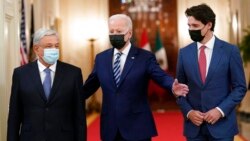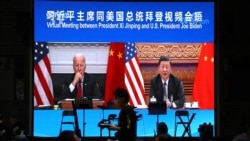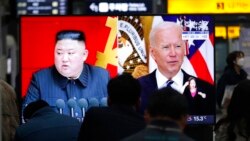President Joe Biden came into office at a time when U.S. standing in the world had reached a record low point. Across 60 countries and areas surveyed by Gallup’s U.S. Leadership Poll during the last year of Donald Trump's presidency, median approval of U.S. leadership stood at 22%.
Six months into Joe Biden's presidency, American global standing had largely rebounded. According to Gallup’s August poll across 46 countries and territories, median approval of U.S. leadership stood at 49%.
Biden entered the presidency with a very low bar, said Thomas Schwartz, a historian of U.S. foreign relations at Vanderbilt University. “Outside of a very few countries, most significantly Israel and Saudi Arabia, Donald Trump was so disliked by most foreign leaders that simply not being Trump was an immediate advantage,” he said.
However, not being Trump could take Biden only so far, said Schwartz. Despite inheriting the deadline to withdraw from Afghanistan from his predecessor, Biden’s disastrous execution of the exit gravely damaged America’s credibility internationally and reputation for competence domestically.
“Terrorism has intensified, and the Taliban takeover has led to sanctions that have put Afghanistan in a position where it has an acute humanitarian crisis that could well lead to mass famine,” said Michael Kugelman, a senior associate for South Asia at the Wilson Center. “And I think that this very precipitate, chaotic U.S. withdrawal is seen as links to those outcomes.”
The tumultuous withdrawal betrayed Western and other allies, including the increasingly educated women of Afghanistan who will suffer the most under the Taliban, said Kenneth Weinstein, Walter P. Stern distinguished fellow at the Hudson Institute. It will make it harder for American presidents to ask our allies to sacrifice for common goals in the future, he added.
Weinstein pointed to the administration’s handling of the southern border as another failure. As the crisis grew, Weinstein said, the U.S. has returned to “watered-down versions of Trump administration policies that the Biden-Harris campaign denounced as inhumane in 2020.”
Is America back?
Following years of “America First” under Trump, Biden delivered a diametrically opposed message that America was back, returning to multilateralism and diplomacy as the main instruments of foreign policy, rejoining multilateral organizations, returning to withdrawn agreements and bringing more engagement on global issues including pandemic recovery and climate change.
“If the measure of success is global engagement and the baseline is 2020, then President Biden's first year in office has been nothing short of restorative,” said Leslie Vinjamuri, director of U.S. and the Americas Program at Chatham House.
Responding to a question from VOA, White House press secretary Jen Psaki listed several achievements, saying the U.S. has reclaimed leadership on some of the biggest global challenges, including the COVID-19 pandemic and climate change, while restoring alliances, resolving trade disputes with European countries, and elevating partnerships in the Indo-Pacific through the Quad (Quadrilateral Security Dialogue) involving the U.S., Australia, India, and Japan, and AUKUS, the trilateral security partnership that includes the U.S., Australia and U.K.
AUKUS will provide Australia with nuclear-powered submarines and promote cutting-edge three-nation collaboration on cyber, artificial intelligence and quantum technologies. “The deal could change the security dynamic of the Indo-Pacific if we can actually deliver the subs before their due date of 2042,” said the Hudson Institute’s Weinstein.
However, AUKUS’s launching blindsided France, a close ally, and scuttled the $66 billion conventional submarine deal Paris had underway with Australia. It was widely seen as another foreign policy blunder and an example of a disconnect between the administration’s messaging and policies.
The administration has shown very little regard for traditional allies and does not back its rhetoric with action that would be discernibly different or better than some of the isolationism seen under Trump, said Dalibor Rohac, a resident scholar at the American Enterprise Institute. Rohac pointed also to the continuation of the European Union travel ban and tariffs months into the administration as other illustrations of the disconnect.
“Whether the president can bridge the gap between rhetoric and action is the most important question facing him today,” Rohac said.
China and Russia
Managing strategic competition with Beijing, a key doctrine of the Trump administration, remains the defining framework of the U.S.-China relationship under the current administration.
Biden met with Chinese President Xi Jinping virtually in November to discuss “ongoing effort to responsibly manage” a relationship that threatens to spiral out of control between two rivals competing in areas of trade, geopolitical influence and, more recently, military might.
The biggest thorn in this troubled U.S.-China relationship is the issue of Taiwan, a democratic self-governing island that Beijing considers a breakaway province.
“The United States is asking China not to escalate pressure on Taiwan. China is asking the United States not to fiddle around with and test the limits of the One China policy,” said Robert Daly, director of the Wilson Center's Kissinger Institute on China and the United States, describing a key point in the Biden-Xi meeting. “Both countries are guilty as charged, and neither is in a position where it's going to reconsider its policies.”
Meanwhile, Russia is not staying on the sidelines. In recent weeks President Vladimir Putin has mobilized tens of thousands of troops along the Ukrainian border. He says he wants to prevent NATO’s eastward expansion — the main focus of the Biden-Putin virtual summit in December.
“What we’re seeing here is some behavior from the Russian Federation to remind the United States that it’s still there, it still has interests that it wants to pursue and that those interests can’t be ignored,” said Andrew Lohsen, fellow in the Europe, Russia, and Eurasia Program at the Center for Strategic and International Studies.
Moscow recently outlined demands for a sweeping new security arrangement with the West, including a guarantee that NATO will not only cease expanding farther east but also will roll back all military activity in Ukraine and elsewhere in Eastern Europe, Central Asia and the Caucasus. It also included a ban on sending U.S. and Russian warships and aircraft to areas within striking distance of each other’s territory.
Russia wants Washington and Moscow “to sit down and draw up the world like it's 1921 instead of like it's 2021,” said Max Bergmann, senior fellow at the Center for American Progress. The tough demands appear certain to be rejected by the U.S. and its allies, who insist that Moscow does not dictate NATO’s expansion.
The administration says it will continue to hold high-level talks with both Moscow and Beijing, not only to avoid conflict but also to collaborate on areas of common interest, such as the pandemic, climate change and regional issues like Iran.
So far, Biden’s two-track strategy of deterrence and diplomatic engagement has not led to grave setbacks or negative consequences, said Leslie Vinjamuri of Chatham House. “But defending the rules-based order in the context of power shifts and technological change — and in a world where the leading powers embrace radically different value systems — is a tall order and the future is uncertain,” she said.
Moreover, Putin’s threats to Ukraine and Xi’s crushing of democracy in Hong Kong, intimidation of Taiwan and allegedly genocidal policies toward the Uyghurs has fed the narrative of an administration too weak to stand up forcefully for American interests and values against aggressive adversaries, said Vanderbilt University’s Thomas Schwartz. “Iran’s continuing defiance and move toward acquiring a nuclear weapon strengthen this portrait,” he said.
Other unsolved problems include North Korea, where the administration appears in no hurry to push for a deal unless Kim Jong Un commits to winding down his nuclear weapons program, and simmering tensions between Israel and Hamas. More than one year following the Abraham Accords that normalized diplomatic relations between Israel and two of its Arab neighbors, the administration has reestablished ties with Palestinians severed under Trump but has made little progress in advancing the broader Middle East peace process.
Democracies vs autocracies
The administration frames relations with rivals in the context of a global struggle, drawing a fault line between democracies and autocracies.
"We'll stand up for our allies and our friends and oppose attempts by stronger countries that dominate weaker ones, whether through changes to territory by force, economic coercion, technical exploitation or disinformation,” Biden said in remarks at the U.N. General Assembly in September. “But we're not seeking — say it again, we are not seeking — a new Cold War or a world divided into rigid blocs.”
A “Cold War mentality” is exactly what China and Russia accuse Washington of fostering. Their leaders were excluded from the Summit for Democracy where Biden hosted more than 100 countries on December 9-10. Xi and Putin held their own virtual meeting a week after the democracy summit.
While activists applaud the summit’s goals of “strengthening democracy and defending against authoritarianism,” combating corruption and promoting human rights, some analysts warn of overreach.
If Biden pushes his democracy-vs.-autocracy framing too far, there’s a danger of losing collaborative ground on global issues such as climate change with China and arms control with Russia, said Stacie Goddard, Mildred Lane Kemper professor of political science at Wellesley College. “Those are the types of global issues where you really do need that type of cross-ideological cooperation,” she said.









